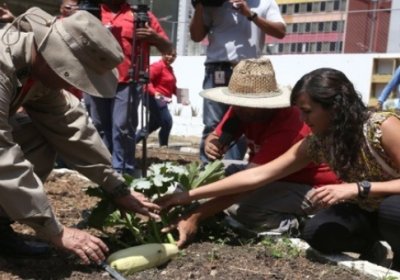 Venezuelan President Nicolas Maduro at a demonstration in support of the government's emergency economic measures emergency measures, Caracas, May 14. Photo via AVN.
Venezuelan President Nicolas Maduro at a demonstration in support of the government's emergency economic measures emergency measures, Caracas, May 14. Photo via AVN.
Bolivarian revolution
 Venezuelan President Nicolas Maduro at a demonstration in support of the government's emergency economic measures emergency measures, Caracas, May 14. Photo via AVN.
Venezuelan President Nicolas Maduro at a demonstration in support of the government's emergency economic measures emergency measures, Caracas, May 14. Photo via AVN.
Agustin Otxotorena, a Basque executive living in Caracas, grew tired of constant calls from friends and relatives in Spain telling him that there was no food in Venezuela. So on May 20, he began publishing photos on Facebook of supermarkets in upscale sectors of Caracas filled with goods.
Ecuadorean President Rafael Correa spoke out on June 1 about efforts by right-wing political forces in Latin America to oust democratically-elected governments, saying that it would set a dangerous precedent for democracy in the region.
“Right-wing politicians don't just want to return to power, they want to return with a thirst for vengeance,” said Correa during an interview with Ecuador Public Television.
Venezuela's socialist president Nicolas Maduro told a crowd of supporters on May 15 that to increase productivity and help alleviate scarcity of basic products facing the South American nation, all businesses and factories closed down by their owners would be seized and handed over to their workers so production could be restarted. “A stopped factory [is] a factory turned over to the people,” Maduro said. “The moment to do it has come, I'm ready to do it to radicalise the Revolution.”
 Members of Commune Alberto Lovera in Anzoategui state taking part in their communal fishing enterprise. Photo from Venezuela Analaysis.
Members of Commune Alberto Lovera in Anzoategui state taking part in their communal fishing enterprise. Photo from Venezuela Analaysis.
Peace, unity and prosperity was the message on March 5, which marked the third anniversary of the death of Venezuela's late socialist president Hugo Chavez.
A 100-day Plan for urban agriculture started on February 28 in eight Venezuelan cities in a bid to provide about 1300 people with vegetables and fruits.
Urban agriculture minister Lorena Freitez said one of the plan's objectives consists of teaching people how to cultivate and stir their interest for agriculture.
In the long term, the products should be able to supply about 20% of the total food consumption of the residents living in the eight participating cities: Barcelona, Barquisimeto, Caracas, Los Teques, Maracaibo, Maracay, Mérida y Valencia.
Venezuelan President Nicolas Maduro announced the creation of a National Productive Corporation on February 22, as part of a new socialist enterprise system aimed at coordinating efforts among existing state, communal and mixed firms.
Speaking from the Ana Maria Campo Petrochemical Complex in Zulia state, the socialist leader said the new entity would be tasked with unifying the more than 1000 public enterprises in a “single vision of planning, management, productivity, and maximum efficiency”.
Protesters in working-class western Caracas hijacked trucks belonging to Venezuela’s number one private food chain, Polar, on February 18, demanding the company cease hoarding essential goods.
The Polar food and beverage conglomerate is Venezuela’s largest private food provider, selling a range of products from beer to corn flour. But its owner, millionaire businessman Lorenzo Mendoza, has been consistently embroiled in scandal.
In the aftermath of Venezuela's right-wing US-backed opposition securing its electoral win over President Nicolas Maduro's United Socialist Party of Venezuela (PSUV) in the December 6 National Assembly elections, the South American country is heading for two confrontations, each reinforcing the other — a political and an economic one. The future is very uncertain.
Facing possible austerity and a return to neoliberalism at the hands of a right-wing parliament, will the millions involved in Venezuela's Bolivarian revolution that has cut poverty and empowered the poor radicalise further and protect their 15 years of gains? Or will this be the blow that finally dampens their revolutionary joy and collective ambition?
On December 6, Venezuela held its 20th election in 17 years and one of its most difficult yet. With the opposition upping the ante in terms of media attacks and sabotage, 2.5 years of economic difficulties and since the passing of revolutionary leader Hugo Chavez, not to mention a recent right-wing victory in Argentina, the left and right around the world turned anxious eyes to Venezuela.
- Previous page
- Page 10
- Next page








